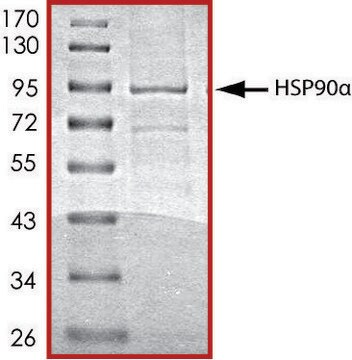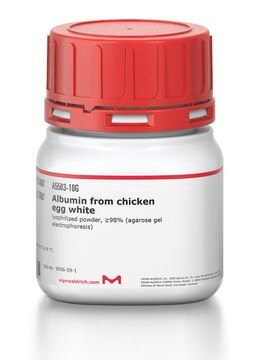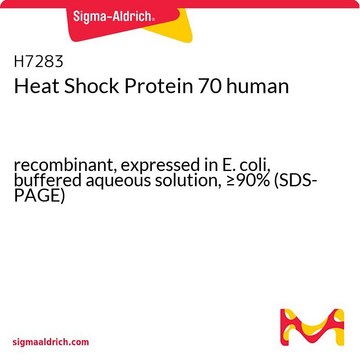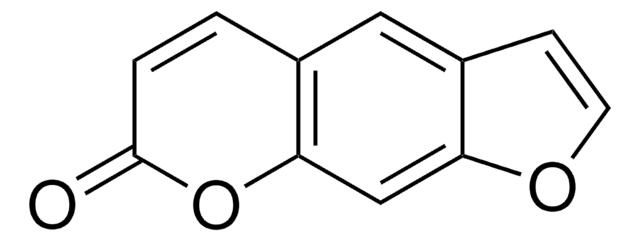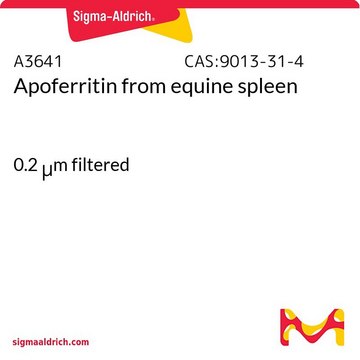推荐产品
生物源
human
重組細胞
expressed in E. coli
化驗
≥70% (SDS-PAGE)
形狀
buffered aqueous glycerol solution
分子量
~37 kDa
NCBI登錄號
應用
cell analysis
運輸包裝
dry ice
儲存溫度
−70°C
基因資訊
human ... PCNA(5111)
一般說明
PCNA (proliferating cell nuclear antigen) gene is mapped to human chromosome 20p12.3 and encodes a scaffolding protein. PCNA is a homotrimeric protein known to localize in the nucleus. The PCNA ring has a central cavity that is large enough to allow the dsDNA to slide freely along it. PCNA is a nuclear protein whose appearance correlates with the proliferative state of the cells and is a cofactor of DNA polymerase delta.
生化/生理作用
Proliferating cell nuclear antigen (PCNA) significantly maintains the longevity of mature neutrophil granulocytes. Upregulation of the PCNA gene is observed in cervical squamous cell carcinoma. PCNA supports cell survival by elevating metabolism flux. PCNA expression is known to offer resistance to chemotherapy. PCNA is a homotrimer and helps increase the processivity of leading strand synthesis during DNA replication. In response to DNA damage, PCNA is ubiquitinated and is involved in the RAD6-dependent DNA repair pathway. Immunofluorescence studies have shown that p300 may play a role in DNA repair synthesis through its interaction with PCNA. In vitro and in vivo p300 forms a complex with PCNA that does not depend on the S phase of the cell cycle and stimulates DNA synthesis in vitro. PCNA interacts with the Williams syndrome transcription factor (WSTF) allowing it to target to DNA replication foci, that then allows recruitment of SNF2H.
外觀
Supplied in 50mM sodium phosphate, pH 7.0, 300mM NaCl, 150mM imidazole, 0.1mM PMSF, 0.25mM DTT, 25% glycerol.
準備報告
after opening, aliquot into smaller quantities and store at -70 °C. Avoid repeating handling and multiple freeze/thaw cycles
訊號詞
Danger
危險聲明
危險分類
Eye Irrit. 2 - Repr. 1B - Skin Irrit. 2
儲存類別代碼
6.1C - Combustible acute toxic Cat.3 / toxic compounds or compounds which causing chronic effects
水污染物質分類(WGK)
WGK 1
閃點(°F)
Not applicable
閃點(°C)
Not applicable
Proliferating cell nuclear antigen prevents trinucleotide repeat expansions by promoting repeat deletion and hairpin removal
Beaver JM, et al.
DNA Repair, 48(2), 17-29 (2016)
Cytoplasmic proliferating cell nuclear antigen connects glycolysis and cell survival in acute myeloid leukemia
Ohayon D, et al.
Scientific reports, 6(3), 35561-35561 (2016)
Raymond A Poot et al.
Nature cell biology, 6(12), 1236-1244 (2004-11-16)
Chromatin states have to be faithfully duplicated during DNA replication to maintain cell identity. It is unclear whether or how ATP-dependent chromatin-remodelling factors are involved in this process. Here we provide evidence that the Williams syndrome transcription factor (WSTF) is
Mutations at multiple CDK phosphorylation consensus sites on Cdt2 increase the affinity of CRL4Cdt2 for PCNA and its ubiquitination activity in S phase
Nukina K, et al.
Genes Cells, 23(3), 200-213 (2018)
S Hasan et al.
Nature, 410(6826), 387-391 (2001-03-27)
The transcriptional coactivator p300 interacts with many transcription factors that participate in a broad spectrum of biological activities, such as cellular differentiation, homeostasis and growth control. Mouse embryos lacking both p300 alleles die around mid-gestation, with pleiotropic defects in morphogenesis
我们的科学家团队拥有各种研究领域经验,包括生命科学、材料科学、化学合成、色谱、分析及许多其他领域.
联系客户支持
